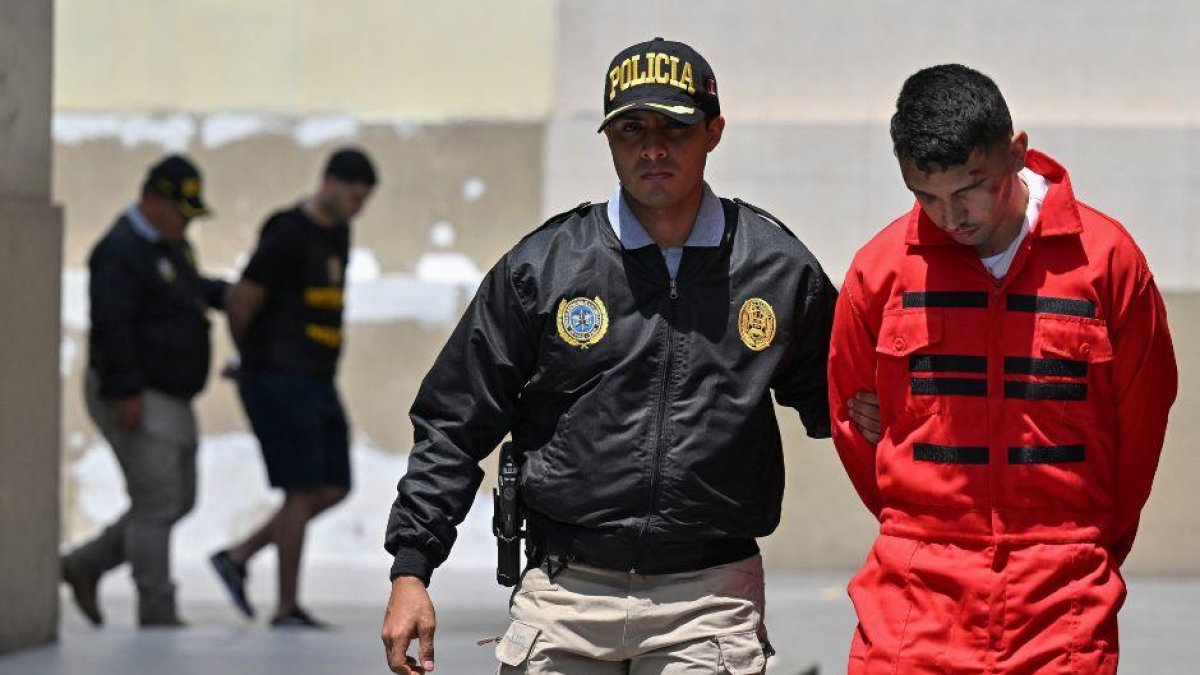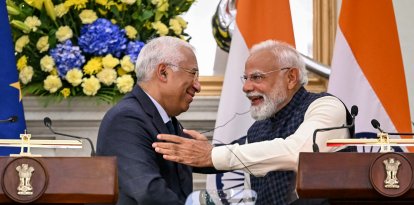El Tren de Aragua: the Venezuelan opposition denounces that Maduro is "exporting criminals" to all American countries
The arrest of an alleged member of this gang in Georgia and the linking of the Chilean prosecutor's office to the kidnapping and murder of Ronald Ojeda with the criminal group impact the Chavista dictatorship.

Un miembro del Tren de Aragua capturado por la Policía de Perú. (Cris BOURONCLE / AFP)
The kidnapping and death of former Venezuelan lieutenant Ronald Ojeda in Chile has sparked an international earthquake with its epicenter in Caracas. While suspicions continue about the direct participation of agents of the dictatorship in these events, the Chilean Prosecutor's Office points to El Tren de Aragua, a violent criminal gang born in Venezuela. And precisely what neither FBI experts nor the exiles fleeing the regime have any doubts about. Maduro believes that he "is exporting" members of this and other criminal groups to third countries to destabilize them and even reach collaboration agreements to combat them by making it easier for them to act in their territory.
In the US, several individuals have already been detected with tattoos and behaviors that link them to the dangerous Venezuelan group. In fact, last Thursday the Georgia prosecutor's office pointed out that Diego Ibarra, arrested for trying to deceive the authorities with a false residence card and brother of the suspect in the murder of the nursing student Laken Riken In this same state, could be a member of El Tren de Aragua. In February, the US Immigration and Customs Enforcement Service (ICE) confirmed that at least two of the illegal immigrants who beat two police officers in New York were part of this organization.
They are not isolated events. Chris Swecker, assistant director of the Criminal Investigation Division of the FBI between 2004 and 2006, denounced that both El Tren de Aragua and Mara Salvatrucha 13 are gaining strength in the country. Regarding the rise of the Venezuelan gang, Swecker was blunt: "I think ( Maduro) is deliberately emptying his prisons and sending these people here, just like Fidel Castro did in the 80s."
The rapid extension of El Tren de Aragua in America
However, the US is not the only country in which this group has extended its networks, which especially target South America, and its presence has been reported in 10 countries. Chile signed a collaboration agreement with Venezuela in January, and one of the main reasons was for Caracas to help the Boric Government combat the growing criminal activity of El Tren de Aragua in its territory, which is suffering an unstoppable wave of crimes and violence. The death of former lieutenant Ojeda seemed to bring together both Venezuelan actors : agents of the Bolivarian regime acting as hitmen for the gang or even using members to carry out the crime.
A relationship that Vice Admiral Mario Iván Carratú does not doubt from Florida, where he has gone into exile. "The regime uses the underworld as an element of control over Venezuelans," so there is no doubt that it is sending them abroad with the same mission as the Cuban dictatorship did years ago.
The Venezuelan dissident William Cárdenas , who currently resides in Spain, denounces in conversation with Voz Media that behind this expansion is the dictatorship itself: "They are exporting criminals to all American countries. They are mafias that reach agreements on crime markets, and our neighbors are paying the consequences of having allowed themselves to subsist with a narco-state without applying collective correctives. Does anyone know, for example, where the inmates of the Tocorón Prison went, released by an agreement between Pranes and Maduro's executive?"
Use of criminals to reach agreements with third countries
Something that the Venezuelan internationalist corroborates Oswaldo Silva from Virginia, which points out that thanks to the presence of these criminals in third countries "The Chavista regime can put the fact of collaborating on the negotiating table in operations to capture these criminal groups, or simply allow deportation of the same to Venezuela. The departure abroad of criminal organizations such as El Tren de Aragua allows the Chavista regime and its collaborators to expand their underground economic activities , use them as a threat to destabilize third countries, and be a resource to force deals and agreements of a political or security nature."
From Germany, opposition member Daniel Lara Farías assures that this is a modern version of Castro's use of mass immigration as a weapon. According to Lara Farías, without the intervention of the state it would not be possible for such a high number of these criminals to cross its borders: "For a person belonging to an armed gang, with a record or with arrest warrants to be able to leave the country, many things They have to go. In my opinion, the Castro technique of using mass migration as a weapon has been carried out by Chavismo for years, and the technique of contaminate genuine migration with criminal elements (as Fidel did in the Mariel crisis) is more than obvious with events that occur in different parts of the world."
They denounce that Maduro offers to clear the records of criminals who leave the country
Esteban Hernández, editor-in-chief of Contra Poder News, in Florida, also insists on this argument, based on " the criminal nature of the regime " and information from Venezuela that assures that the dictatorship is offering many criminals to clear their record if they leave. Venezuela:

























